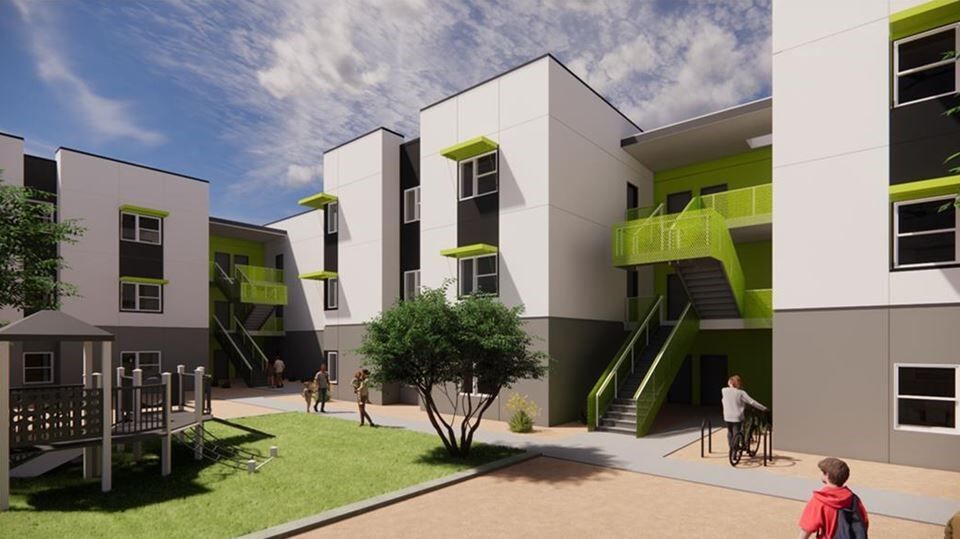While escalating rents in the Tucson area are cause for concern among tenants, they are also a source of frustration for officials trying to address the problem.
Some older apartment complexes, that once offered affordable housing units, are being sold to investors who make cosmetic upgrades and increase rents.
Meanwhile, the government is sitting on a pot of money to help landlords keep their properties in the affordable housing supply.
It is not a problem unique to the local market.
In June, the national median asking rent surpassed $2,000 for the first time, versus $1,599 this time last year — an increase of 28%
In Tucson, the median asking rent is $1,965 — up from $1,251 in 2021, a 57% increase.
The reason is a lack of housing units because:
The increased cost of buying a home has some residents staying in rental units longer.
An influx of remote workers from more expensive West Coast markets has allowed landlords to charge premium rents.
Developers of new complexes often face pushback from residents opposed to density, congestion and noise.
And, Tucson has historically been an inexpensive market, so investors have snapped up rental properties in response to these factors.
Incentives available, but few takers
The Arizona Department of Housing has about $185 million to support affordable housing projects.
Of that, $10 million is earmarked for landlords to keep their complexes affordable. If landlords receive government assistance for their complexes, they are required to keep them affordable for 15 years.
“Once you reach the 15-year timeframe for keeping them affordable, state law allows the owner to sell the property on the open market and that’s what’s happening,” said Tom Simplot, the department’s director. “We’re trying to encourage these operators to come back to us in exchange for adding 15 years.”
Arizona offers between $30,000 and $60,000 per unit for upgrades if landlords will keep them affordable.
“We’ve had no takers,” Simplot said, “so we still have money left in that pot.”
He said developers can qualify for federal low-income tax credits if projects are built near transit or job sites, but the state cannot require developments be affordable housing.
In Tucson there is a pilot program to incentivize affordable housing by giving developers more heights or less parking requirements if some of the units are affordable.
“They’re ahead of the game,” Simplot said.
The challenge is getting past neighbors who don’t want tall buildings blocking their city or mountain views.
“We know NIMBYism is real,” Simplot said. “We’re looking for examples from other states on how they’re getting around resistance because right now there are no incentives for neighbors to compromise.”
He said the government’s role is to facilitate developers’ ability to build with tools such as rezoning or building entitlements.
“The government doesn’t build buildings,” Simplot said. “Without our private partners, housing doesn’t get built.”
Working to fill the housing need
One of those partners, Newport SW LLC, is about to break ground on its second affordable housing complex in Tucson.
The outfit is a joint venture between Newport Partners in Irvine, California, and Sabino Community Development Resources in Tucson.
The first complex was the 40-unit Newport at Amphi, on Prince Road and Stone Avenue, that opened in December and was fully rented by the end of January, said David Wohl, the company’s president.
The next complex, the 77-unit Newport at the Rodeo, will go up at 5301 S. Nogales Highway, just south of Irvington Road.
Rents in the complexes range from a low of $588 for a one-bedroom unit to $988 for a three-bedroom unit.

Vacant land at 5301 S. Nogales Highway, south of Irvington Road, which will become Newport at the Rodeo, where rent will range from a low of $588 for a one-bedroom unit to $988 for a three-bedroom unit.
The 25-year company has always specialized in affordable housing, Wohl said.
“It’s a feel-good business and we’re comfortable doing what we do,” he said. “That’s our niche.”
The new complex will have 19 units that are project-based rental subsidies, which means Section 8 vouchers are assigned to the project, not to the tenant, and people who make as little as 30% the area median income can qualify.
That is about $44,000 for a household or $25,000 for an individual.
Wohl said the appeal of the Nogales Highway site, which sits on vacant land, was its proximity to the El Pueblo Community Center, schools and bus lines.
The company is not interested in building market rate apartments at this time but is interested in buying an older, rundown complex and fixing it up.
But those complexes go quickly, and expensively, to investors.
“Some people are paying millions for these not-so-great apartments, slapping on a coat of paint and doubling the rents,” Wohl said.
Landlords looking to get out of the business are commanding high dollar.
“Sometimes they’re paying up to $300,000 per door,” he said of the price some investors will pay per unit. “We can’t compete with that.”
The Newport at the Rodeo complex is expected by be complete by the end of 2023.
Information on applications is expected to be announced in the fall.
Find out what new restaurants are opening in Tucson, along with developments in the local housing market and commercial real estate.







